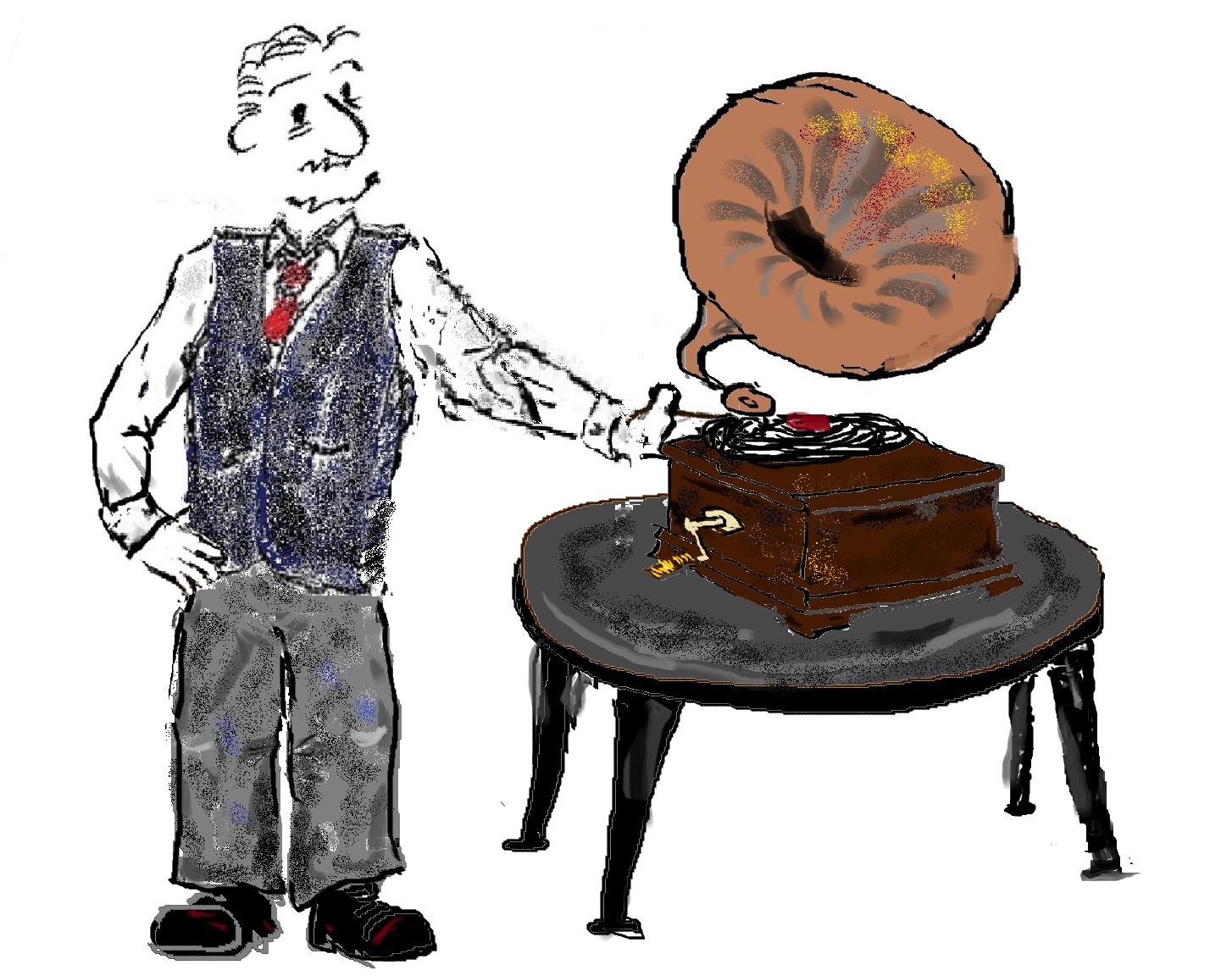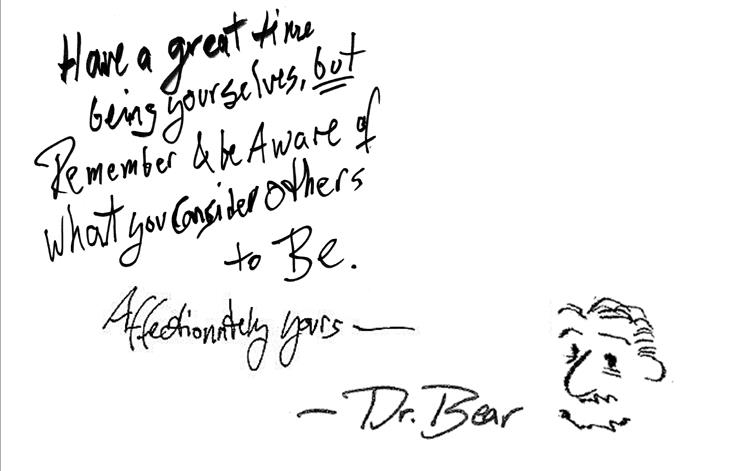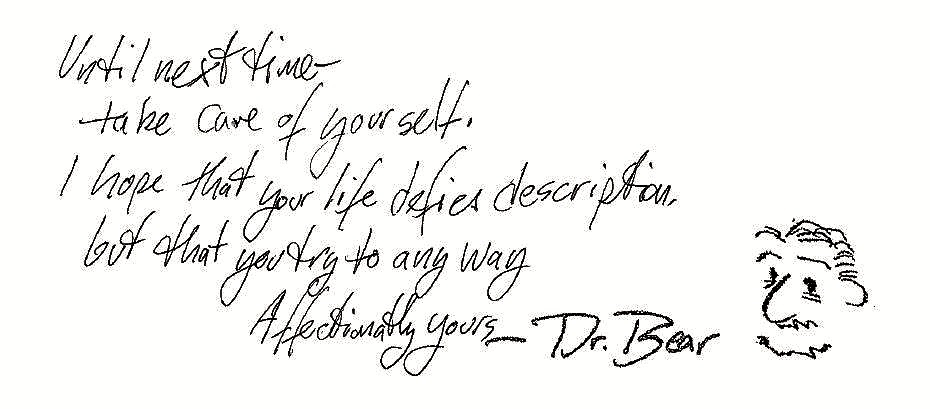Monthly Archives: February 2015
The Second Person
Once upon a time, a long, long time ago, the English language had 3 ways of saying you: “þū” (pronounced like ‘thoo’) for one of you, “ġit” (pronounced like ‘jit’) for two of you, and ġē” (pronounced like ‘jee’) for several of you. That is Old English.  In Middle English, the second person pronoun was simplified to “thou” and “ye.” Today, in modern English, we only have “you.” Of course, there are regional exceptions, such as the “y’all” of the South, the northern “you guys,” “you-uns,” which is spread across the Ohio River Valley and parts of old Appalachia, its derivative “yinz,” which is a defining characteristic of Pittsburghese, and “yous,” Digression226 which persists in English speaking pockets from New Jersey, Boston, and Philly, all the way to Ireland, South Africa, Australia, and New Zealand.
In Middle English, the second person pronoun was simplified to “thou” and “ye.” Today, in modern English, we only have “you.” Of course, there are regional exceptions, such as the “y’all” of the South, the northern “you guys,” “you-uns,” which is spread across the Ohio River Valley and parts of old Appalachia, its derivative “yinz,” which is a defining characteristic of Pittsburghese, and “yous,” Digression226 which persists in English speaking pockets from New Jersey, Boston, and Philly, all the way to Ireland, South Africa, Australia, and New Zealand.
It is not uncommon for languages to slur and simplify. However, in English, there are important social factors and meanings to this change. How I speak to a second person is also a strong indication of how we interact. As Middle English developed a court  language for the gentry, it adopted what is called the T/V distinction. In several European languages, the plural 2nd person becomes an honorific, a formal address of respect to superiors. examples include the tu/vous in French, the du/sie in German, and tú/usted in Spanish. By contrast the singular denoted either a lower class, or a sense of intimacy. The farmer would address his lord as “you” and his child as “thou.” The Lord would address other nobility as “you,” but address both the farmer and his child as “thou.”
language for the gentry, it adopted what is called the T/V distinction. In several European languages, the plural 2nd person becomes an honorific, a formal address of respect to superiors. examples include the tu/vous in French, the du/sie in German, and tú/usted in Spanish. By contrast the singular denoted either a lower class, or a sense of intimacy. The farmer would address his lord as “you” and his child as “thou.” The Lord would address other nobility as “you,” but address both the farmer and his child as “thou.”
However, at the same time, the rising middle class began to blur the rigid class  distinctions, and adopted using “you” in all interactions. In part, to show they were not from the lower classes and provincials and in part because the formal was the language of business. One says: “How are you today, sir?” as a courtesy and a sign of respect to any customer walking in the door, but one also expects that courtesy to be returned. Similarly, everybody became “Master” or “Mister,” and “Mistress” or “Mrs.” Digression227
distinctions, and adopted using “you” in all interactions. In part, to show they were not from the lower classes and provincials and in part because the formal was the language of business. One says: “How are you today, sir?” as a courtesy and a sign of respect to any customer walking in the door, but one also expects that courtesy to be returned. Similarly, everybody became “Master” or “Mister,” and “Mistress” or “Mrs.” Digression227
 What was gained by this change to you was an equality of address, but a formal equality. What was lost was the familiarity and intimacy of thou-ing someone. It has its few remnants, but for the most part it sounds archaic. Emily Dickinson’s:
What was gained by this change to you was an equality of address, but a formal equality. What was lost was the familiarity and intimacy of thou-ing someone. It has its few remnants, but for the most part it sounds archaic. Emily Dickinson’s:
Wild nights – Wild nights! Were I with thee Wild nights should be Our luxury!
…sounds sweetly archaic, like an ancient ode. It doesn’t sound like wild nights.
The Quakers became known for always using the familial “thou” to demonstrate their belief in universal brotherhood, as well as their unwillingness to 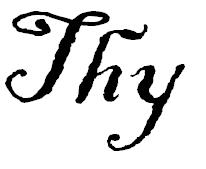 participate in inequality. In a way, it seems odd that the leveling of English chose the genteel formal, instead of the Quaker’s familiarity. Then again, maybe it says something about us that we don’t miss the familiar pronoun. The informal formality of the second person might be an accurate indication of who we are and how we interact. We can be friendly while keeping a distance, casual without being intimate; that is who we have become.
participate in inequality. In a way, it seems odd that the leveling of English chose the genteel formal, instead of the Quaker’s familiarity. Then again, maybe it says something about us that we don’t miss the familiar pronoun. The informal formality of the second person might be an accurate indication of who we are and how we interact. We can be friendly while keeping a distance, casual without being intimate; that is who we have become.
We have acquired the easy manners of the sales person, showing respect and being friendly, but at the same time easily disposing of the conversation and forgetting about it as it passes. We laugh at the second person’s joke in an open, friendly way, all the while thinking of something else. We can get personal without recognizing persons, as well as “nice” and “sweet” without bothering to be genuine.
Of course, we are not slaves to the laws of language, even if we are grounded by them. Like the laws of gravity and inertia, we can defy language occasionally by acts of will and imagination.
We must remember to ask ourselves: Who is this you? Each second person—singular or plural—is their own first person. When we ask “How are you?” we must remember that the you is an I with his or her own concerns. When we say “thank you,” whom are we thanking? When we say “I’ll be with you in a moment,” who is the person thinking “Great. Now I have to wait again?” When we yell “FUCK YOU!!” who is the vulnerable me we are yelling at?
Second Person
Once upon a time, a long, long time ago, the English language had 3 ways of saying you: “þū” (pronounced like ‘thoo’) for one of you, “ġit” (pronounced like ‘jit’) for two of you, and ġē” (pronounced like ‘jee’) for several of you. That is Old English.  In Middle English, the second person pronoun was simplified to “thou” and “ye.” Today, in modern English, we only have “you.” Of course, there are regional exceptions, such as the “y’all” of the South, the northern “you guys,” “you-uns,” which is spread across the Ohio River Valley and parts of old Appalachia, its derivative “yinz,” which is a defining characteristic of Pittsburghese, and “yous,” Digression226 which persists in English speaking pockets from New Jersey, Boston, and Philly, all the way to Ireland, South Africa, Australia, and New Zealand.
In Middle English, the second person pronoun was simplified to “thou” and “ye.” Today, in modern English, we only have “you.” Of course, there are regional exceptions, such as the “y’all” of the South, the northern “you guys,” “you-uns,” which is spread across the Ohio River Valley and parts of old Appalachia, its derivative “yinz,” which is a defining characteristic of Pittsburghese, and “yous,” Digression226 which persists in English speaking pockets from New Jersey, Boston, and Philly, all the way to Ireland, South Africa, Australia, and New Zealand.
It is not uncommon for languages to slur and simplify. However, in English, there are important social factors and meanings to this change. How I speak to a second person is also a strong indication of how we interact. As Middle English developed a court  language for the gentry, it adopted what is called the T/V distinction. In several European languages, the plural 2nd person becomes an honorific, a formal address of respect to superiors. examples include the tu/vous in French, the du/sie in German, and tú/usted in Spanish. By contrast the singular denoted either a lower class, or a sense of intimacy. The farmer would address his lord as “you” and his child as “thou.” The Lord would address other nobility as “you,” but address both the farmer and his child as “thou.”
language for the gentry, it adopted what is called the T/V distinction. In several European languages, the plural 2nd person becomes an honorific, a formal address of respect to superiors. examples include the tu/vous in French, the du/sie in German, and tú/usted in Spanish. By contrast the singular denoted either a lower class, or a sense of intimacy. The farmer would address his lord as “you” and his child as “thou.” The Lord would address other nobility as “you,” but address both the farmer and his child as “thou.”
However, at the same time, the rising middle class began to blur the rigid class  distinctions, and adopted using “you” in all interactions. In part, to show they were not from the lower classes and provincials and in part because the formal was the language of business. One says: “How are you today, sir?” as a courtesy and a sign of respect to any customer walking in the door, but one also expects that courtesy to be returned. Similarly, everybody became “Master” or “Mister,” and “Mistress” or “Mrs.” Digression227
distinctions, and adopted using “you” in all interactions. In part, to show they were not from the lower classes and provincials and in part because the formal was the language of business. One says: “How are you today, sir?” as a courtesy and a sign of respect to any customer walking in the door, but one also expects that courtesy to be returned. Similarly, everybody became “Master” or “Mister,” and “Mistress” or “Mrs.” Digression227
 What was gained by this change to you was an equality of address, but a formal equality. What was lost was the familiarity and intimacy of thou-ing someone. It has its few remnants, but for the most part it sounds archaic. Emily Dickinson’s:
What was gained by this change to you was an equality of address, but a formal equality. What was lost was the familiarity and intimacy of thou-ing someone. It has its few remnants, but for the most part it sounds archaic. Emily Dickinson’s:
Wild nights – Wild nights! Were I with thee Wild nights should be Our luxury!
…sounds sweetly archaic, like an ancient ode. It doesn’t sound like wild nights.
The Quakers became known for always using the familial “thou” to demonstrate their belief in universal brotherhood, as well as their unwillingness to  participate in inequality. In a way, it seems odd that the leveling of English chose the genteel formal, instead of the Quaker’s familiarity. Then again, maybe it says something about us that we don’t miss the familiar pronoun. The informal formality of the second person might be an accurate indication of who we are and how we interact. We can be friendly while keeping a distance, casual without being intimate; that is who we have become.
participate in inequality. In a way, it seems odd that the leveling of English chose the genteel formal, instead of the Quaker’s familiarity. Then again, maybe it says something about us that we don’t miss the familiar pronoun. The informal formality of the second person might be an accurate indication of who we are and how we interact. We can be friendly while keeping a distance, casual without being intimate; that is who we have become.
We have acquired the easy manners of the sales person, showing respect and being friendly, but at the same time easily disposing of the conversation and forgetting about it as it passes. We laugh at the second person’s joke in an open, friendly way, all the while thinking of something else. We can get personal without recognizing persons, as well as “nice” and “sweet” without bothering to be genuine.
Of course, we are not slaves to the laws of language, even if we are grounded by them. Like the laws of gravity and inertia, we can defy language occasionally by acts of will and imagination.
We must remember to ask ourselves: Who is this you? Each second person—singular or plural—is their own first person. When we ask “How are you?” we must remember that the you is an I with his or her own concerns. When we say “thank you,” whom are we thanking? When we say “I’ll be with you in a moment,” who is the person thinking “Great. Now I have to wait again?” When we yell “FUCK YOU!!” who is the vulnerable me we are yelling at?
Instant Spiced Tea
I recognize that there are tea snobs out there to whom this would be anathema. To those who whip matcha into green tea, or try to find new “more authentic” teas, anything that begins with “1 cup of Tang” this may be cringe-worthy. Sometimes, however, you just need that warm comfort thing to get you through the winter. I have heard this called Russian Tea (I have no idea why) and Friendship Tea (because it is good to mix up large quantities and share it with friends–maybe even in a sweet little mason jar).
I got this recipe from my Mother.
- 1 cup Tang
- 1 cup instant sweetened lemonade
- ½ cup instant unsweetened iced tea
- 1 tsp cinnamon
- 1 tsp cloves
- ½ tsp nutmeg
Step 1, Roll Call! assemble all the ingredients, as well as a big bowl. Make sure you have a clean or several clean containers to store the mix in when you are done.
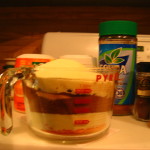 Step 2, mixing it up: combine all the ingredients in the big bowl. Double it if you want to make more. Mix it very well. Put the mixture in your “container for the thing contained.
Step 2, mixing it up: combine all the ingredients in the big bowl. Double it if you want to make more. Mix it very well. Put the mixture in your “container for the thing contained.
Step 3, instant gratification: when you want some, add some to a cup. I usually add 2 teaspoons to a mug,  1 tablespoon to a big mug. As with all cups of tea, it’s not too bad with a shot of rum.
1 tablespoon to a big mug. As with all cups of tea, it’s not too bad with a shot of rum.
(Kraken: I’m willing to talk about product placement!)
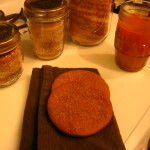 Step 4 deferred gratification: give away the jars to people whom you would like to warm up a bit. Maybe they have cookies, and you can have a grand old time. Maybe they will stare at you funny. In which case, go home, go to Step 3, wrap yourself in a quilt, and read a good book.
Step 4 deferred gratification: give away the jars to people whom you would like to warm up a bit. Maybe they have cookies, and you can have a grand old time. Maybe they will stare at you funny. In which case, go home, go to Step 3, wrap yourself in a quilt, and read a good book.
…..Or come to the bistro.
Filmgoat
Audiogoat
As usual, for my friends who have trouble sleeping, or for those who just prefer their Bistro aurally, here is the the audio version of tonight’s post.
Why separate the sheep from the goats?
Happy Chinese New Year!
In today’s recipe, I suggested adding root vegetables, and realized  that there are a large variety of names & nicknames for turnips and rutabagas (turks, swedes, neeps, tumshie, etc.). Since Americans so seldom use these, the names aren’t important, but some places they are, especially as the name says something about how they are to be used.
that there are a large variety of names & nicknames for turnips and rutabagas (turks, swedes, neeps, tumshie, etc.). Since Americans so seldom use these, the names aren’t important, but some places they are, especially as the name says something about how they are to be used.
 We cannot think without categories, and cannot share our thoughts without terms for these categories. Because I encounter them rarely (especially in this weather), it is not necessary for me to distinguish between different kinds of monkeys. It is possible, in fact even probably, that there are people for whom the differences between the 260-odd kinds of monkey are much more important, and much more pronounced.
We cannot think without categories, and cannot share our thoughts without terms for these categories. Because I encounter them rarely (especially in this weather), it is not necessary for me to distinguish between different kinds of monkeys. It is possible, in fact even probably, that there are people for whom the differences between the 260-odd kinds of monkey are much more important, and much more pronounced.
Many 20th century thinkers dealt with the question of categories, Michel Foucault, George Lakoff, to name a few. In his piece ‘El idioma analítico de John Wilkins’, Jorge Luis Borges, writes of a fabled Chinese dictionary entitled The Celestial Emporium of Benevolent Knowledge, in which animals can be:
- (a) those belonging to the Emperor
- (b) those that are embalmed
- (c) those that are tame
- (d) pigs
- (e) sirens
- (f) imaginary animals
- (g) wild dogs
- (h) those included in this classification
- (i) those that are crazy-acting
- (j) those that are uncountable
- (k) those painted with the finest brush made of camel hair,
- (l) miscellaneous
- (m) those which have just broken a vase
- (n) those which, from a distance, look like flies.
Today, according to the lunar calendar used in China, is the beginning of a new year. The sign for this year in the astrological calendar is 羊 (yang), not to be confused with 陽 (yang), one of the elements of the  . If you look at 羊 , you might notice that it has little horns on the top. It refers to a general kind of horned animal, sometimes a sheep, sometimes a goat,
. If you look at 羊 , you might notice that it has little horns on the top. It refers to a general kind of horned animal, sometimes a sheep, sometimes a goat,  sometimes a ram. The BBC, The Old Gray Lady, NPR and other western news sources are unsettled by the vagueness of this name and category, but China has managed to get by with it for centuries.
sometimes a ram. The BBC, The Old Gray Lady, NPR and other western news sources are unsettled by the vagueness of this name and category, but China has managed to get by with it for centuries.
The categories by which we interact with the world make them our worlds, but they also make the world for other people. Heidegger once wrote that “Language is the house of being. In its home human beings dwell. Those who think and those who create with words are the guardians of this home.” So be careful whom you call a sheep and whom you call a goat.
I’ll leave you with my best wishes, and this quote from Borges:
The impossibility of penetrating the divine scheme of the universe does not, however, dissuade us from planning human schemes, even though we know they must be provisional.
Shepherd’s Pie without the Yang
This would have originally been Shepherd’s Pie, but the shepherds have grown more clever and figured out the thing with the box of donuts and the net, so this is vegetarian.
It is quite cold, and this is a warm, simple recipe.
Speaking of which, Happy Chinese New Year!
Since this recipe contains neither sheep nor goats, we will avoid the whole semantic argument.
I didn’t actually measure anything, so it will be approximate.
Ingredients:
- 1 pastry pie crust
- some olive oil
- 1/2 lb sliced mushrooms
- 1 small onion, chopped
- 2 chopped carrots
- chopped root vegetable: turk (neeps, turnips), beets, parsnips, what have you
- some (to taste, maybe one small) diced potatoes
- 3/4 cups TVP (texturized vegetable protein)
- 1 packet Colman’s Shepherd Pie seasonings (available at Krogers, and at other fine retailers.
- 2 bottles of Stout, red wine, water, or broth
- 1/2 cup red lentils
- 1/2 cup frozen or fresh peas
- 1/2 cup cheddar cheese (I prefer Dubliner or Cabots, both of which are rennet free)
- 3 cups or so of mashed potatoes
Step 1, It’s called pie for a reason: Bake a pie shell or acquire one by other means.
Step 2, frying: in a pot, heat a little oil and add the sliced mushrooms and onion. After they are browned, add the protein mixture and stir fry it a bit. Add the chopped carrots and potatoes.
In an iron pan (my iron pot is roughly the diameter of the pie tin, so I went with it), sauté sliced mushrooms until browning, then onions until browning, then add carrots, then slices of turk (turnip) and beet, then finally a little red onion.
Step 3, stewing: add a pack of Colman’s Shepherd Pie seasonings, 3/4 of a cup or so of TVP, a quarter cup or so of red lentils, and two bottles of Porter or Stout. You could use any liquid: wine, broth, whatever’s handy. If really using a Stout or Porter, make sure it isn’t too bitter. Stir and bring to a bubble, then cover and allow this to simmer for 30 minutes or so, while you prepare the mashed potatoes.
Step 4 mashing potatoes: my great, great grandmother made mashed potatoes for folks starting the Oregon Trail in Western Pennsylvania. It’s what made this country great.
Step 5,, putting it all together: fill the pie tin with the stew, sprinkle with some sharp cheddar, Top with mashed potatoes, broil the top of the potatoes a bit, and there you go.
Shout Out: Abbrev’s
A shout out to another imaginary restaurant, this one so hip it could only be in Austin.
This appears to be the Überminimalist cuisine, and I want all my hipster readers to know about it so that you can say you were into it before it was cool.

In the words of the proprietors:
Check them out at: http://www.abbrevsrestaurant.com/

Why not a film version?

